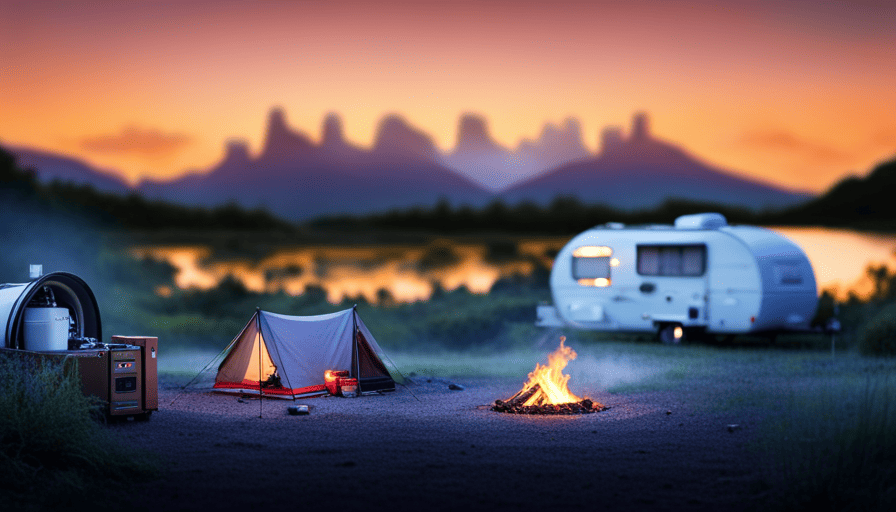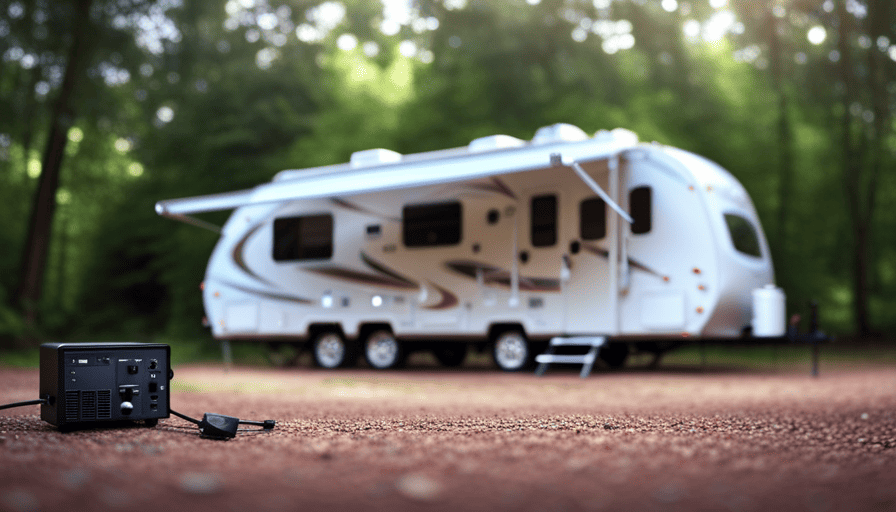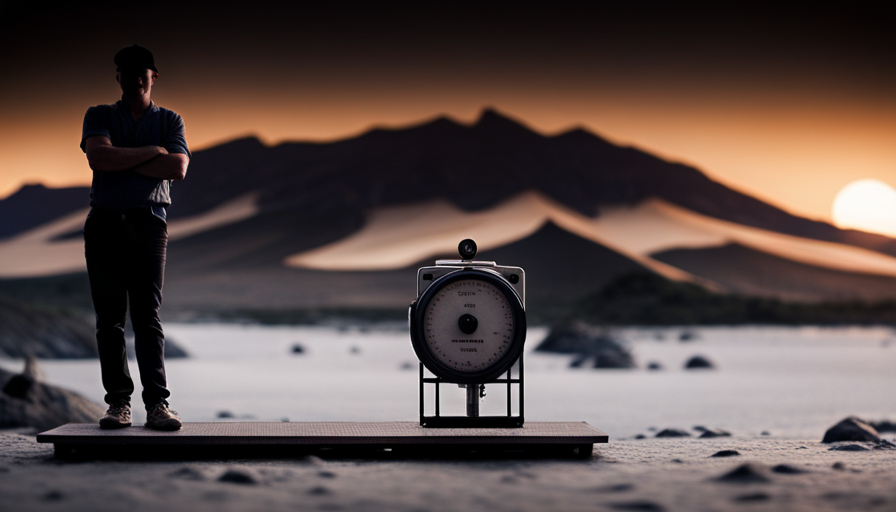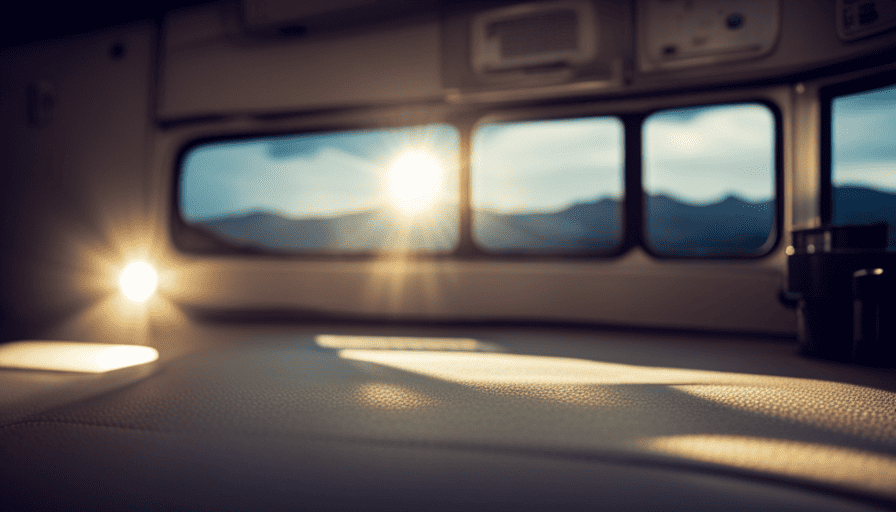Were you aware that a typical camper consumes around 1,500 to 3,500 watts of electricity daily?
When it comes to camping, having a reliable generator is essential to ensure that you have enough power to run all your appliances and devices.
But how do you determine the right wattage for your camper?
In this article, I will guide you through the process of calculating your power needs and choosing the right generator type for your camper.
We will also discuss important factors such as the size and weight of the generator, safety considerations, and noise levels.
Additionally, I will provide tips on reading customer reviews and recommendations, consulting with professionals, and considering the environmental impact of your generator.
By the end of this article, you will have all the information you need to make an informed decision and ensure a comfortable camping experience with the right watt generator for your camper.
Key Takeaways
- Consider the power needs of your camper by listing all appliances and finding their power consumption ratings.
- Understand the difference between starting watts and running watts to determine the appropriate size of the generator.
- Choose a fuel-efficient generator with eco-mode or smart throttle feature to minimize fuel consumption.
- Read customer reviews, consult professionals, and consider environmental impact when selecting the right generator for your camper.
Calculate Your Power Needs
To figure out the perfect generator size for your camper, you’ll need to calculate your power needs. Start by making a list of all the appliances and devices you’ll be using in your camper. This may include items like a refrigerator, air conditioner, microwave, TV, lights, and charging ports for your electronic devices. Once you have your list, find the power consumption ratings for each item. These ratings are usually listed in watts or amps.
Next, calculate the total power consumption by adding up the wattage or amp ratings of all the items on your list. This will give you an estimate of the maximum power usage at any given time. Keep in mind that some appliances may have a higher starting wattage than their running wattage, so take this into account when calculating your power needs.
Once you have determined your power consumption, you can choose the right generator type that will provide enough power for your camper. Consider factors such as portability, noise level, and fuel type, as well as the generator’s capacity to meet your power needs.
With this information in hand, you’ll be well-equipped to select the perfect generator for your camping adventures.
Choose the Right Generator Type
When choosing the right type of generator for your camper, it’s important to explore different options and consider the validity of certain theories to engage your audience.
One crucial aspect to consider is the generator’s features. Look for a generator that has the necessary outlets to power all your camper appliances and devices. Additionally, consider generators with features like automatic voltage regulation and noise reduction, as these can enhance your camping experience.
Fuel efficiency is another critical factor to keep in mind. Opt for a generator that’s designed to be fuel-efficient, as this can save you money in the long run and reduce your carbon footprint. Look for generators that have an eco-mode or smart throttle feature, which adjusts the engine speed based on the power load, ensuring optimal fuel consumption.
When considering the size and weight of the generator, it’s important to choose one that’s portable and easy to transport. A lightweight generator will be easier to handle and fit into your camper without taking up too much space. Additionally, consider the noise level of the generator, as you don’t want it to disturb the tranquility of your camping experience.
Consider the size and weight of the generator as you move on to the next section about ‘considering the noise level and runtime of the generator’.
Consider the Size and Weight of the Generator
When considering the size and weight of a generator for my camper, I need to evaluate the portability and storage requirements of different models.
This involves determining how easy it is to transport and store the generator, as well as whether it will fit in the available space in my camper.
Additionally, I must ensure that the generator is of an appropriate size that will meet my power needs while still being manageable for me to handle.
Evaluate the portability and storage requirements of different generator models
Consider the portability and storage requirements of various generator models to find the perfect wattage for your camper. When evaluating the fuel efficiency of different generator models, it’s important to consider how much power you’ll need and how long you plan to use the generator. Some models may be more fuel efficient, allowing you to run your camper for longer periods without needing to refuel.
Additionally, comparing the noise levels of different generator models is crucial, especially if you plan to camp in quiet areas or if you prefer a more peaceful camping experience. Look for generators that offer lower decibel ratings to ensure minimal disturbance.
By assessing these factors, you can determine the appropriate size based on your camper’s available space and power requirements seamlessly.
Determine the appropriate size based on your camper’s available space
To find the perfect generator size for your camper’s available space, imagine effortlessly fitting a compact powerhouse that will keep your adventure going strong. In order to determine the appropriate size, you need to evaluate the available power sources in your camper and assess its electrical requirements. A good way to visualize this is by using a table to compare the different power sources and their corresponding electrical needs. Here is an example:
| Power Source | Electrical Requirement |
|---|---|
| Refrigerator | 300 watts |
| Air Conditioner | 1,500 watts |
| Lights | 50 watts |
By listing all the appliances and their power requirements, you can easily calculate the total wattage needed for your camper. This will help you determine the starting and running watts required, which we will discuss in the subsequent section. Transitioning into the next topic, it is important to understand the starting and running watts to ensure you choose the right generator for your camper’s needs.
Determine the Starting and Running Watts
To properly determine the size of the generator needed for my camper, I must understand the difference between starting watts and running watts. Starting watts refer to the initial surge of power needed to start an appliance, while running watts refer to the continuous power required to keep it running.
By calculating the total power needed based on the highest starting wattage of my appliances, I can ensure that the generator I choose can handle the load and provide reliable power during my camping trips.
Understand the difference between starting watts and running watts
Knowing the difference between starting watts and running watts will help you determine the right wattage for your camper’s generator. Here are four key points to understand:
-
Surge Watts vs. Rated Watts: Starting watts, also known as surge watts, refer to the extra power needed by appliances during startup. On the other hand, running watts indicate the continuous power required to keep the appliances running smoothly.
-
Importance of Generator Fuel Efficiency: When selecting a generator, consider its fuel efficiency. A more efficient generator will consume less fuel, which can save you money and reduce environmental impact.
-
Avoid Overloading: It’s crucial to choose a generator with enough starting watts to handle the initial surge of power. Overloading the generator can lead to damage or failure.
-
Calculate Total Power Needed: To determine the wattage required for your camper, calculate the total power needed based on the highest starting wattage of your appliances. This will ensure your generator can handle all the startup demands without issues.
Transitioning to the next section, we will now calculate the total power needed for your camper.
Calculate the total power needed based on the highest starting wattage of your appliances
Understanding the difference between starting watts and running watts is essential in determining the total power needed for your camper. This ensures that all your appliances can handle the initial surge of power without any issues. Starting watts refer to the extra power required by an appliance when it is first turned on, while running watts indicate the continuous power needed to keep the appliance running smoothly.
To calculate the total power consumption, you need to consider the highest starting wattage of all your appliances and add it to the sum of their running wattages. This will give you the maximum power capacity your generator should have. By accurately determining the generator capacity, you can avoid overloading it and ensure that all your appliances can operate efficiently.
Now, let’s move on to the next section and account for safety and noise levels in selecting the right generator for your camper.
Account for Safety and Noise Levels
Safety and noise levels are no joke when it comes to picking the right watt generator for your camper – you don’t want it sounding like a squadron of jet engines taking off! When considering the safety precautions and impact on wildlife, it’s important to choose a generator that meets noise level regulations and has safety features such as overload protection and low oil shutdown.
Noise pollution can disturb nearby campers and wildlife, so opting for a quieter generator is not only considerate but also helps to preserve the tranquility of the outdoors.
In terms of safety precautions, make sure to properly ground the generator and follow all manufacturer guidelines for safe operation. Additionally, it’s important to store fuel in a safe and well-ventilated area away from the generator and any heat sources. This reduces the risk of fire or explosion.
When it comes to wildlife, loud generator noise can disrupt their natural habitats and behavior. By selecting a generator with lower decibel levels, you can minimize the impact on wildlife and create a more peaceful camping experience.
Considering the budget and long-term use, it’s essential to find a balance between power needs and cost. Transitioning into the next section, it is important to consider the budget and long-term use of the generator to ensure you make an informed decision.
Consider the Budget and Long-Term Use
To make sure you get the most out of your camping experience, take a moment to consider your budget and how you plan to use the generator in the long run.
When it comes to budget considerations, it’s essential to strike a balance between affordability and quality. Here are five factors to keep in mind:
-
Power Output: Determine the wattage requirements of your camper and choose a generator that can meet those needs without exceeding them.
-
Fuel Efficiency: Look for generators that offer good fuel efficiency to minimize long-term costs.
-
Durability: Consider the build quality and materials used in the generator to ensure it can withstand outdoor use and last for years.
-
Maintenance: Check if the generator requires regular maintenance and factor in additional costs for upkeep.
-
Noise Level: Opt for a quiet generator to maintain a peaceful camping environment and avoid disturbing fellow campers.
By taking these budget considerations and long-term usage factors into account, you can make an informed decision that meets your camping needs while staying within your budget.
Once you have narrowed down your options, the next step is to read customer reviews and recommendations to gather insights and make a confident purchase.
Read Customer Reviews and Recommendations
Listen up, fellow camper! Before you make your final decision, it’s crucial to dive into the ocean of customer reviews and recommendations, like a seasoned sailor seeking hidden treasures.
When it comes to choosing the right generator for your camper, hearing from other customers can provide valuable insights into customer satisfaction and common issues. By reading customer reviews, you can gauge the overall satisfaction level of other campers who’ve already purchased and used the generator you’re considering. Look for patterns in the reviews to identify any recurring problems or concerns. Pay attention to specific details about performance, durability, noise level, and ease of use. This information will give you a clearer picture of what to expect from a particular generator and help you make an informed decision.
Additionally, customer recommendations can be a great source of guidance. Find out which generators are highly recommended by experienced campers who’ve been in similar situations. Their firsthand experiences can save you from potential pitfalls and help you choose a generator that meets your specific needs.
Now that you’ve gathered insights from customer reviews and recommendations, it’s time to consult with a professional to ensure your final choice aligns with your camper’s power requirements.
Consult with a Professional
After thoroughly researching customer reviews and recommendations, I realized that determining the right watt generator for my camper can be a complex task. To ensure I make an informed decision, I’ve decided to consult with a professional.
There are several benefits to seeking expert advice in this matter. First and foremost, professionals have in-depth knowledge and experience in the field of generators, making them well-equipped to guide me towards the most suitable option for my camper’s power needs. They can assess my specific requirements, taking into account factors such as the size of my camper, the appliances I plan to use, and the duration of my trips.
Consulting with a professional will also help me avoid potential pitfalls and costly mistakes. They can provide valuable insights on generator maintenance, safety precautions, and other critical considerations that I might overlook. Additionally, their expertise can assist in selecting a generator that’s fuel-efficient, reliable, and durable.
By consulting with a professional, I can make a well-informed decision regarding the watt generator for my camper. This ensures that I not only meet my power requirements but also consider the environmental impact of my choice.
Consider Environmental Impact
Considering the environmental impact is crucial when selecting the right generator for your camper. Not only do you want a generator that meets your power needs, but you also want one that minimizes harm to the environment.
To achieve this, it’s important to explore renewable energy options and consider ways to reduce your carbon footprint. There are several renewable energy options available for campers. Solar panels can be a great choice as they harness energy from the sun to power your camper. They are silent, produce no emissions, and can be used to charge batteries for use during the night.
Wind turbines are another option, especially if you camp in windy areas. These turbines convert wind power into electricity, providing a clean and sustainable energy source.
Reducing your carbon footprint is another important aspect to consider. Look for generators that are designed to be energy efficient, consuming less fuel while still meeting your power requirements. Also, consider using biofuels instead of traditional gasoline or diesel. Biofuels are made from renewable sources such as vegetable oils or animal fats, and they produce fewer emissions compared to fossil fuels.
By considering renewable energy options and reducing your carbon footprint, you can make a positive impact on the environment while enjoying the comforts of your camper.
In the next section, we’ll discuss how to test and maintain your generator to ensure its optimal performance.
Test and Maintain Your Generator
Before each camping trip, I always make sure to perform regular maintenance checks on my generator and follow the manufacturer’s guidelines. This ensures that my generator is in proper working condition and ready to use.
I also make it a point to test my generator before each trip to confirm that it’s functioning as expected.
Perform regular maintenance checks and follow manufacturer’s guidelines
To keep your camper running smoothly, it’s essential to perform regular maintenance checks and follow the manufacturer’s guidelines. This will ensure that your generator is in proper working condition when you need it most. Here are three important steps to include in your maintenance schedule:
-
Conduct regular oil changes and filter replacements as recommended in the manufacturer’s guidelines. This will help keep the generator’s engine clean and running efficiently.
-
Inspect and tighten all electrical connections to prevent any loose connections or potential hazards. A troubleshooting guide provided by the manufacturer can help you identify and rectify any electrical issues.
-
Clean the air filter regularly to prevent dust and debris from clogging the engine. A clogged air filter can reduce the generator’s performance and increase fuel consumption.
By following these maintenance steps, you can ensure that your generator is always ready for your camping adventures.
Before each trip, it’s also important to test your generator to ensure it’s in proper working condition. Transitioning into the next section, testing your generator before each camping trip will give you peace of mind knowing that it’ll perform reliably when you need it.
Test your generator before each camping trip to ensure it is in proper working condition
Make sure you give your generator a test run before every camping trip to ensure it’s ready to go when you hit the road. Proper generator maintenance is crucial for optimal performance and longevity.
Start by checking the fuel and oil levels, ensuring they’re at the recommended levels. Inspect the spark plug for any signs of wear or damage, and clean or replace it if necessary. Verify that all electrical connections are secure and free from corrosion.
Test the generator’s output voltage and frequency using a multimeter to ensure it’s within the manufacturer’s specifications. If any issues arise during the test, refer to the troubleshooting tips provided by the manufacturer.
Regularly testing your generator before each camping trip will help identify any potential problems and ensure a smooth and enjoyable camping experience.
Frequently Asked Questions
What are the most important factors to consider when choosing a generator for a camper?
When choosing a generator for a camper, two important factors to consider are the generator power output and fuel efficiency. The generator power output determines how much electrical power the generator can provide, ensuring that it meets the energy demands of your camper.
Fuel efficiency is crucial as it affects how long the generator can run on a tank of fuel, minimizing the need for frequent refueling. These factors help ensure a reliable and energy-efficient power source for your camper.
Are there any safety precautions I should be aware of when using a generator for my camper?
Generator safety is of utmost importance when using it for your camper. Before starting, make sure that the generator is placed outdoors in a well-ventilated area to prevent carbon monoxide poisoning. Regular maintenance is crucial to keep it running smoothly. Check the oil level and filter regularly, and inspect the fuel lines for leaks. Following these precautions and performing routine maintenance will help ensure the safe and efficient operation of your generator. Remember, safety comes first!
How does the size and weight of a generator affect its performance for a camper?
The size and weight of a generator can greatly impact its performance for a camper. A smaller and lighter generator is generally more portable and easier to handle, making it ideal for camping trips. However, larger generators often have higher wattage capacities, allowing them to power more appliances and devices simultaneously.
Additionally, the size and weight can also affect the generator’s fuel efficiency and noise level, with smaller generators typically being more fuel-efficient and quieter.
What are some common issues or maintenance tasks that I should be prepared for when using a generator for my camper?
When using a generator for my camper, there are certain common maintenance tasks and troubleshooting issues that I should be prepared for.
Regularly checking and changing the oil, air filter, and spark plug is crucial for optimal performance.
Additionally, keeping the fuel system clean and inspecting the fuel lines for any leaks is important.
Troubleshooting issues may include addressing starting problems, low power output, or issues with the generator’s control panel.
What are some alternative power sources or options for campers besides using a generator?
When considering alternative power sources for campers, two options to explore are solar panels and battery packs.
Solar panels harness sunlight to generate electricity, providing a sustainable and environmentally friendly solution. They can be mounted on the roof of the camper and convert solar energy into usable power.
Battery packs, on the other hand, store electricity that can be used to power various devices in the camper. These alternatives offer flexibility and independence from traditional generators.
Conclusion
After carefully considering power needs, generator types, size and weight, as well as safety and noise levels, it’s crucial to consult with a professional to ensure the right choice for your camper.
Just like a compass guiding a lost traveler through rough terrain, a well-chosen generator will provide the necessary power to keep your camper running smoothly.
By testing and maintaining your generator, you can rely on it like a faithful companion, ensuring a comfortable and enjoyable camping experience.










